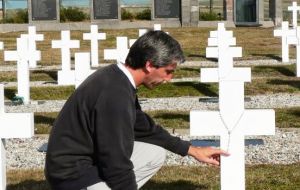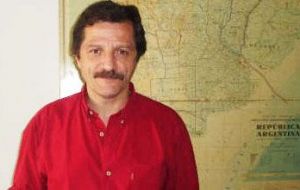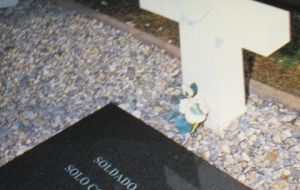MercoPress. South Atlantic News Agency
Four Argentines plan to swim the Falklands' Sound on an “identity cause”
 “The humanitarian aspect has to be differentiated from politics. This humanitarian task, not political” argued Julio Aro.
“The humanitarian aspect has to be differentiated from politics. This humanitarian task, not political” argued Julio Aro.  “We need a unanimous approach. All families must be involved, even those that don't support the initiative” underlined Trejo
“We need a unanimous approach. All families must be involved, even those that don't support the initiative” underlined Trejo  The Argentine Memorial at Darwin which holds the remains of Argentine combatants most “Argentine soldier, known only to God”.
The Argentine Memorial at Darwin which holds the remains of Argentine combatants most “Argentine soldier, known only to God”. Four Argentine amateur swimmers have been training for over a year preparing for the crossing of the Falklands' Sound which separates the two main islands, West from East Falkland. The purpose of the crossing is to bring attention on the 'delayed' process of identifying the remains of Argentine soldiers buried in the Falklands under a headstone that reads “Argentine soldier, known only to God”.
“We believe it's a way to contribute. Relatives want to know which is the grave of their son so they can deposit a flower. And they are getting old, time is running out”, Guido Ganim was quoted in reference to the 123 unmarked graves at the Argentine Memorial in Darwin, Falklands, who fell during the 1982 South Atlantic conflict.
Supposedly the crossing of the four, which also includes Martín Sánchez, Diego Picardo y Adrián Echevarría, should take place sometime this week. They have been supervised in their training by Claudio Plit, an Argentine Champion Marathon Swimmer, who has virtually swam in all open sea competitions under different current and temperature conditions.
“It's a non political cause and with no profit purpose”, says Ganim. “It's our very modest contribution to the 'identity right' of the former combatants; we're planning to swim across the six kilometers of the sound”.
“I've told them that once they reach the Islands, they must first visit the cemetery. You will see that you have 123 mates supporting you. You won't feel alone” says Julio Aro, head of the “Don't' forget me”, foundation, one of the sponsors of the event.
“Giving each gravestone a name is very important to put an end to the mourning” said Aro who revealed that 84 families have consented and donated DNA samples to the Argentine Forensic Anthropology Team, EAAF.
EAAF believes that at the most in two months it could display a team of twenty people, open the graves, take samples of the remains, close them and return to Buenos Aires to identify them. Aro complained that the team has been ready and waiting for over a year for the green light from the Red Cross.
“The humanitarian aspect has to be differentiated from politics. This a humanitarian task, not political” argued Aro.
But diplomatic differences are not the only barrier since some families have refused to accompany the effort and did not supply blood samples.
“It means reopening unnecessarily old wounds”, argues Cesar Trejo, who is head of the Malvinas fallen relatives families organization, and “this is particularly sensitive if pictures or videos are filtered to the media or the social webs”.
“We need a unanimous approach. All families must be involved, even those that don't support the initiative” underlined Trejo, who added that all families agree that the remains must stay in the Argentine Memorial at Darwin.
Some months ago Luis Fondebrier, who is head of the EFFA team, said remains will stay in the Islands, “we will only take samples from denture, mainly, for the genetic tests to try and reveal their identities”.
During the South Atlantic conflict which took off when Argentina militarily invaded the Islands in April 1982, until they were retaken by a British Task Force, 74 days later on 14th June with the complete surrender of the invading forces, 650 Argentine, 255 British and 3 Islanders lost their lives.




Top Comments
Disclaimer & comment rules-

-

-

Read all commentsTraditionally, protesters walk around holding banners don't they? Or lie down in the road, or somesuch. Not actually go out for a holiday and to enjoy themselves. I may be old fashioned.
Feb 15th, 2016 - 08:25 am 0When is Argentina going to negotiate with the Government of the Falkland Islands for the repatriation of the remains of their fighting men? They were shown no respect by their superiors when alive - why cannot their remains be shown respect and some dignity now? The disputed sovereignty of the archipelago should not be an obstacle to a demonstration of decency!
Feb 15th, 2016 - 08:50 am 0WHEN will Argentina grow up over this issue and face REAITY?
Feb 15th, 2016 - 09:38 am 0If They really want this to be done then they ned to:
1-Contact the authority with jurisdiction over INTERNAL affairs in the Islands - they are the Falkland Islands Govt.
2- Have ready to hand over a list of signed support in this from EVERY family.
concerned.
3- Be able to provide clear evidence and description of what will be physically involved at then cemetery- ie disinterring - OR just making ONE small drill hole a matter of less than 10cm wide down to each body to extract a tissue sample?
If the former - probably forget it as opinion here will be very against it. If the latter - then maybe.
Grow up Argentina over this issue.Stop playing politics with humanitarian issues.
Commenting for this story is now closed.
If you have a Facebook account, become a fan and comment on our Facebook Page!